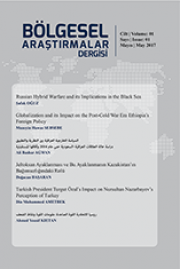السياسة الخارجية العراقية بين النظرية والتطبيق دراسة حالة العلاقات العراقية – السعودية حتى عام 2014 وآفاقها المستقبلية
Iraqi Foreign Policy Between Theory and Practice: Studying the State of Iraqi-Saudi Relations Until 2014 And Future Prospects
Author(s): Ali Bashar AgwanSubject(s): International relations/trade
Published by: Mehmet Seyfettin Erol
Keywords: Iraq; Foreign Policy; Saudi Arabia; Iraq-Saudi Relations; Middle East;
Summary/Abstract: The Iraqi foreign policy was formed after 2003 in a difficult period in which Iraq experienced a destructive war and the state was reshaped numerous times. The Iraqi foreign policy consisted of a complex mix of conflicting interests of internal political forces and driven by external engines that wish to obtain a foothold in the new phase of Iraq. This complex situation has generated an unbalanced Iraqi political performance based on common interests between 2003 and 2014, constructed on the size of internal political interests of political forces and the deepening of relations with them. In general, Iraq's foreign policy from 2003 to 2014 can be characterised at the very least as a turbulent policy that has suffered from a lack of clarity of vision and direction. Perhaps Iraq and its foreign policy are not alone the reason for this fact. The regional environment, its turbulent turmoil, the power of ideological attraction and polarisation and the policy of the international axes and their branches made the Iraqi policy flounder without a clear and coherent vision based on the facts of the internal Iraqi reality. The disincentives of this relationship and its components vary from one stage to the next. Sometimes, the deterioration between the two countries is due to the rigidity of international polarisation and the policy of regional axes and agents. Iraq belonged to the Eastern Soviet camp while Saudi Arabia took part in the American. The economic/oil competition has become the subject of the relationship between the two countries, as was the case after the end of the Iran-Iraq war in 1988. At other times, the geopolitical conflict over the leadership and representation of the Arabian Peninsula in the Arab and Middle Eastern regional system was the subject of competition. The issue of Iraq's invasion of Kuwait led to the collapse of relations with Saudi Arabia in full. At a later moment, the conflict took on highly complex images, bringing the ideological variable as a new source of conflict between the two countries, especially after 2003.
Journal: Bölgesel Araştırmalar Dergisi
- Issue Year: 1/2017
- Issue No: 1
- Page Range: 40-56
- Page Count: 17
- Language: Arabic

